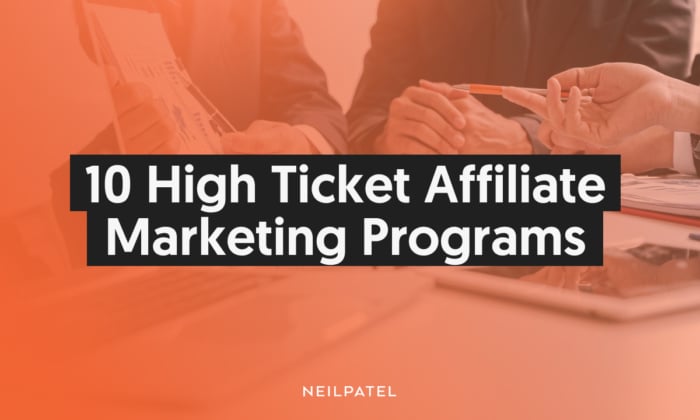
Do you dream of making money while you sleep?
Imagine earning cash while visiting friends, watching television, or even reading this article. Sounds awesome, doesn’t it?
Affiliate marketing is a fantastic way to create revenue. With some preparation and planning, you can encourage people to buy from certain websites and earn a decent commission when they do.
High-ticket affiliate marketing is the next level up from standard affiliate marketing, like the type you see on Amazon. You may need to do some extra work behind the scenes, but the commission you make is much higher.
Want to know more about high-ticket affiliate marketing? I’ll explain what it is, how to get started, and introduce you to some of the most high-profile affiliate marketing programs around.
What Is High-Ticket Affiliate Marketing?
High-ticket affiliate marketing is where you earn money for promoting a product or service on behalf of a business.
As the name suggests, these products and services are “high-ticket”—meaning they’re expensive.
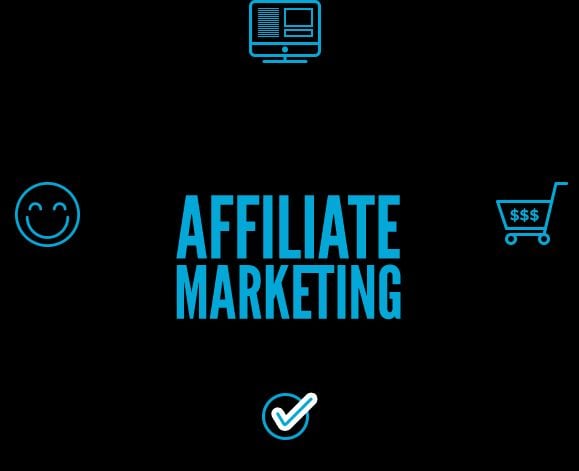
Let’s say you’re an affiliate for Company X, a business that sells web hosting plans. You can promote Company X in many different ways, including:
- Blog posts, comparison articles, and guest articles
- Videos
- Social media platforms and paid social advertising
- Pay-per-click (PPC) advertising
- Email marketing
- Webinars and podcasts
If a prospective customer clicks on one of your links and buys a hosting plan, the sale is accredited to you, and you make a commission. This can either be a percentage of the value of the sale or a flat rate.
Sales are typically tracked using third-party cookies. However, third-party cookies are gradually being phased out. Affiliate marketing platforms are now moving to alternative methods of identifying sales made, including server-to-server tracking.
High-Ticket vs Standard Affiliate Marketing
With high-ticket and standard affiliate marketing, the end goal is the same. You encourage people to buy a product or service in exchange for a commission for each sale.
However, that’s where the similarities end.
With standard affiliate marketing, the price of the products is much lower. So you might promote necklaces that sell for $10, with a commission of 5 percent. This means you earn 50 cents for each sale you make.
With high-ticket affiliate marketing, you might promote designer necklaces that sell for $1,000, with a commission of 10 percent. This means you make $100 dollars for each sale you make.
So with standard affiliate marketing, you’d need to sell 200 necklaces to make $100. With high-ticket affiliate marketing, you’d only need to sell one.
The relationships you build with prospective customers are different too. With standard affiliate marketing, customers tend to purchase quickly, with value in mind. They’ll see a link pointing to a product they like and buy it—job done.
With high-ticket affiliate marketing, building relationships is much more important. You need to nurture prospective customers, build trust and credibility, and show them why they should invest in your product or service. The benefit of this is that because you’ve built a relationship, your customers will be more interested in other items you sell.
High-ticket affiliate marketing takes more time, but can be much more profitable.
High-Ticket Affiliate Marketing Programs to Consider
How can you find high-ticket affiliate marketing programs?
One of the easiest ways is through an affiliate marketing network. These platforms connect you with a range of brands. Here is a list of my top affiliate marketing networks to consider.
Alternatively, here are some of my favorite high-ticket affiliate marketing programs to get you started. Most of them are in the software as a service (SaaS) niche, ideal if you’re a digital marketer, course creator, or marketing blogger.
1. Shopify
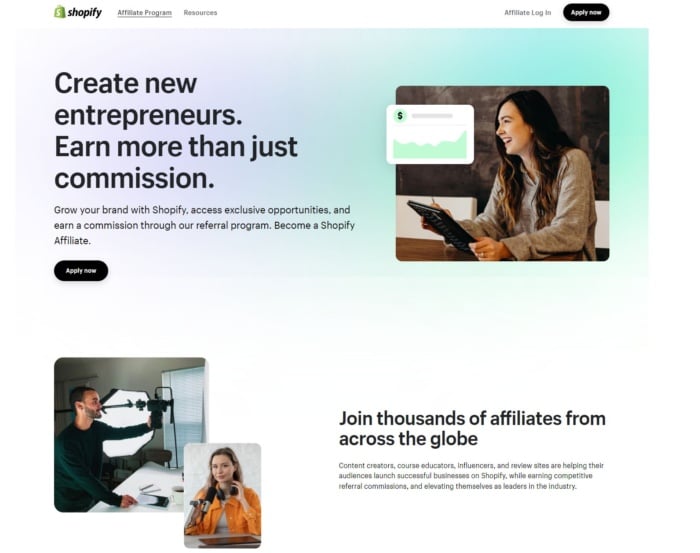
Product sold: e-commerce platform
Typical commission: Up to $150
Pros: Quick approval
Cons: Commission is on the low side
With over four million Shopify stores worldwide, Shopify is one of the most popular and well-loved e-commerce platforms. The Shopify affiliate program lets you earn commission by convincing entrepreneurs to use the platform.
The affiliate program is easy to sign up for and get accepted into—in my experience, you can be up and running in a week. There are many marketing materials to help you get started, and the terms and conditions are straightforward to understand.
One potential drawback is that the commission varies greatly depending on where the signup comes from.
For example, a signup from a merchant in the U.K., U.S., or Canada is worth a one-off fee of $150, but from India or Brazil, it’s worth just $25. Shopify Starter, Shopify Lite, or Shopify Plus are also not eligible for commission. This rules Shopify out as one of the more lucrative platforms.
2. HubSpot
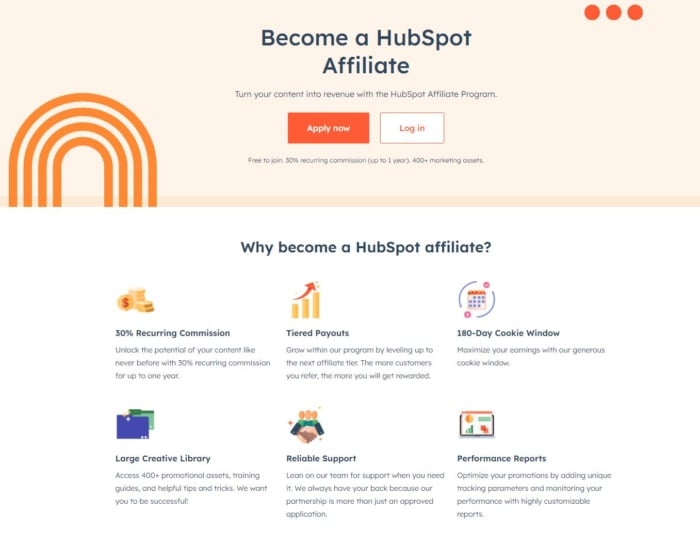
Product sold: CRM system
Typical commission: 30 percent
Pros: Good recurring commission, 180-day cookie window
Cons: Commission expires after 12 months
If you’re looking for a high-ticket affiliate marketing platform to get started on, HubSpot is a reliable choice.
You get a 30 percent recurring commission on subscriptions and a 180-day cookie window. The typical cookie window for affiliate marketing is 30 to 60 days, meaning you have plenty of time to persuade potential customers to sign up.
Another feature I like is the tiered affiliate system. The more signups you bring in, the more benefits you get, including guest blogging opportunities, raffles, and giveaways.
Of course, if there’s a disadvantage, it’s that the 30 percent recurring commission only lasts for a year—after that, you’re back at square one. However, if you’re a fan of the HubSpot system and are confident you can bring in a steady flow of customers, this is a great partner to consider.
3. Kinsta
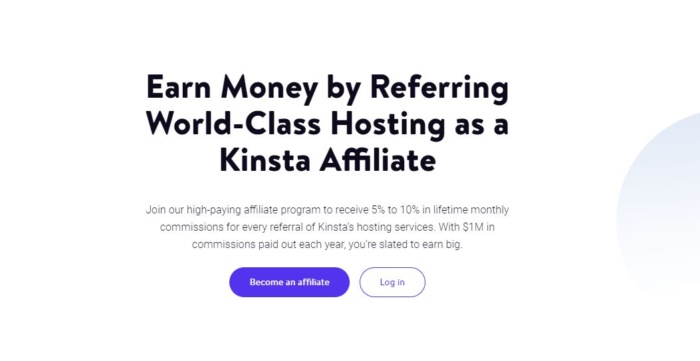
Product sold: Cloud hosting solutions
Typical commission: Up to 10 percent (plus a one-time commission for hosting)
Pros: Immediate approval if you already use Kinsta, solid support
Cons: Payments through PayPal only
Compared to heavy hitters like Shopify and HubSpot, the Kinsta affiliate program isn’t that well-known. This means less competition from other affiliate marketers, which is always a bonus!
Affiliates love the customer service that Kinsta offers, saying that the platform is quick to respond to questions and will do its best to help if a sale doesn’t get tracked.
One downside is that Kinsta sends payouts through PayPal. Since PayPal takes a percentage of your payments as a handling fee, you receive less income.
4. BigCommerce
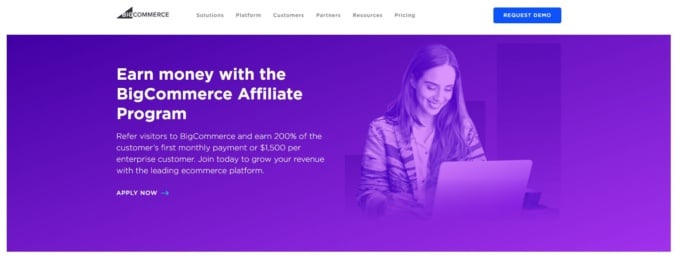
Product sold: e-commerce platform
Typical commission: 200 percent of first monthly payment
Pros: Dedicated account manager, large payouts
Cons: No recurring payments
BigCommerce has a very professional approach to affiliate marketing. You get access to a powerful tracking tool to see which marketing channels are bringing the best results, as well as your very own affiliate manager who will help you get more commission.
Unlike many of the other high-ticket affiliate marketing platforms on this list, BigCommerce doesn’t offer recurring commission. This puts the platform at a significant disadvantage if you’re looking for passive income.
However, 200 percent of the first monthly payment or $1,500 per enterprise referral is definitely worth the hard work!
5. LiquidWeb
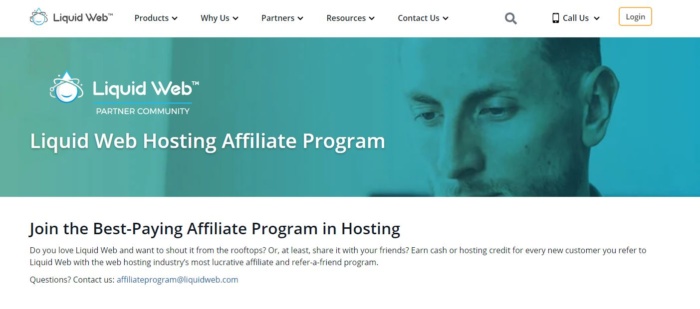
Product sold: Web hosting solutions
Typical commission: A minimum of $150
Pros: Potentially significant earnings
Cons: No recurring payments
LiquidWeb sells many products, from dedicated hosting to managed websites. You earn 150 percent of the monthly hosting cost, at a $150 minimum.
This affiliate platform doesn’t offer recurring payments, but the right dedicated hosting package could result in a $7,000 payday!
6. Fiverr
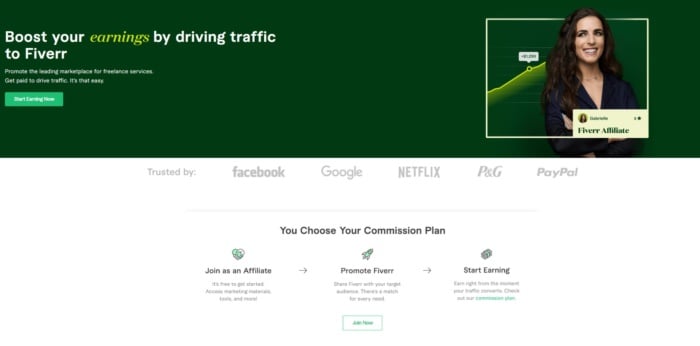
Product sold: Freelancer and business services
Typical commission: 10 percent
Pros: Many different commission options
Cons: Not the easiest commission structure to understand
Fiverr is one of the largest freelance platforms in the world. Its affiliate marketing program gives affiliates lots of flexibility, with many different services to sell. This means you can promote the services that play to your strengths.
For example, you can promote the Fiverr logo maker with a $30 commission for every order. Alternatively, if you encourage a new user to sign up, you get 10 percent of their earnings for life. Not a bad earner!
The downside of Fiverr is that the commission structure can get confusing, with different levels of commission for different services. For example, you get $50 if a customer orders a website or mobile app but only $15 if someone orders a voice-over.
7. Click Funnels
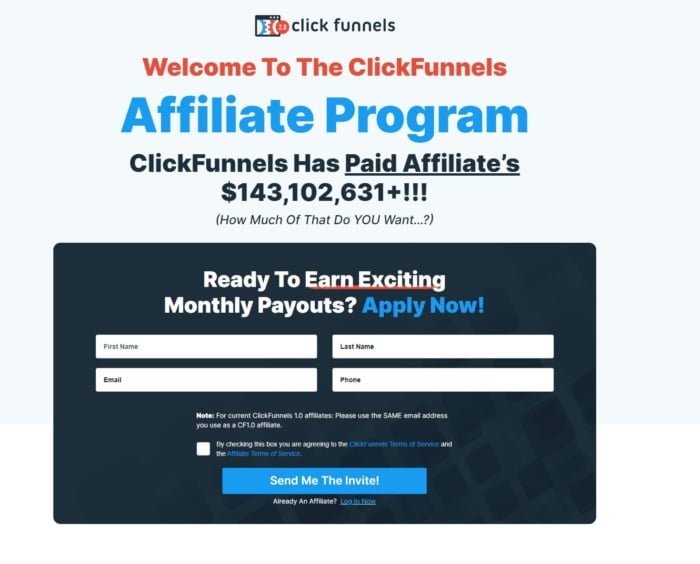
Product sold: Digital marketing tools
Typical commission: 30 percent
Pros: Lots of supporting materials
Cons: Must earn at least $100 in 120 days
Is the Click Funnels affiliate program page a little full-on and intense? Probably. But this high-ticket affiliate marketing program offers a 30 percent recurring commission on all signups regardless of tier level.
I also love that Click Funnels provides access to all its funnel and design templates for you to drive signups, as well as lots of cool training tools. There’s also a Facebook group for affiliates to share advice and wins.
However, you must earn at least $100 every 120 days, or you forfeit your commission. This means you must be dedicated to constantly driving sales; otherwise you could lose out.
8. WP Engine
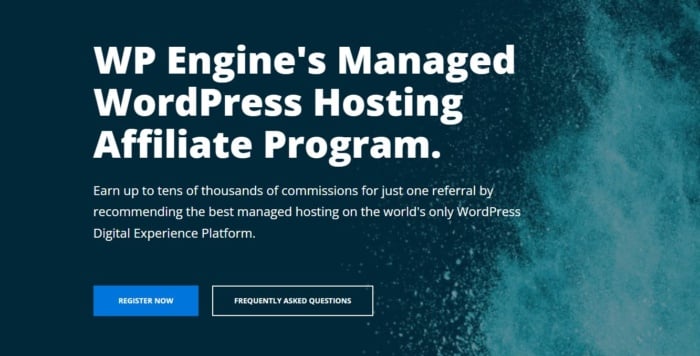
Product sold: Website hosting and WordPress themes
Typical commission: $200 minimum
Pros: 180-day cookies, bonus commissions
Cons: Can only place affiliate links on domains you own
Like Kinsta, WP Engine isn’t one of the better-known high-ticket affiliate marketing programs. However, the platform offers affiliates many advantages. There’s a large 180-day cookie window, personalized benefits for top-earners, and you can even earn money for referrals your affiliates bring in.
WP Engine is quite strict in that you can only place affiliate links on domains you own. You can work around this fairly easily though, for example, linking from YouTube or social media to a landing page on your site.
9. Thinkific
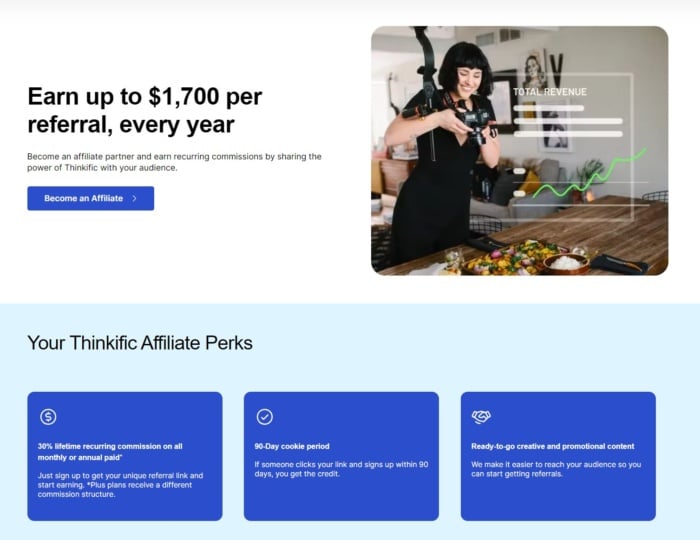
Product sold: eLearning tools
Typical commission: 30 percent
Pros: Recurring commission
Cons: A challenging niche to promote
If you already use Thinkific to host your online courses, signing up as an affiliate is a no-brainer.
With a 30 percent recurring commission and a 90-day cookie window, it’s an excellent way to make some extra cash. I also love how you can give prospective customers a free trial of the Pro plan to convince them to sign up.
Of course, Thinkific is one of the more challenging platforms to sell to customers. Unless they’re already at the bottom of the sales funnel, you’ll need to convince people of the benefits of creating their own course, which can be a hard sell.
10. AuthorityHacker
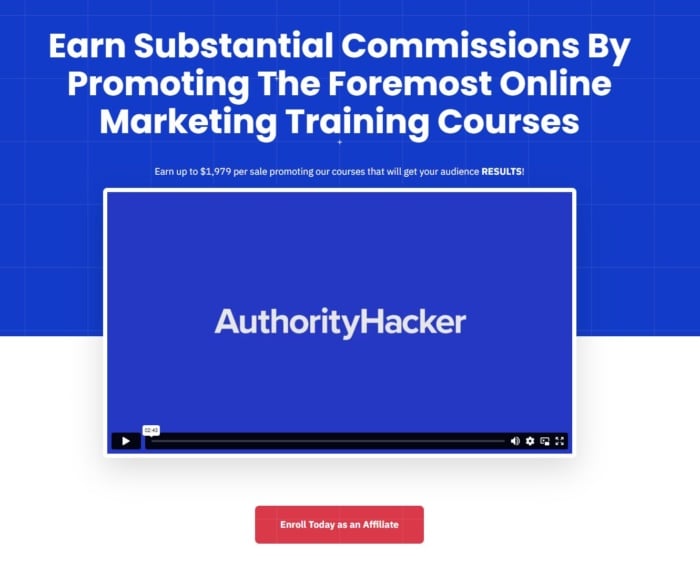
Product sold: Online training courses
Typical commission: Up to $1,979 per sale
Pros: Good commission
Cons: Must make a sale within three months of signing up
AuthorityHacker sells video courses showing how to build SEO-optimized, high-traffic websites. Although the product list is small, the commission rate is excellent. As well as a flat rate for selling a course, you get a lifetime commission on any additional products a customer purchases.
One disadvantage of the AuthorityHacker affiliate program is that you must make a qualifying sale within your first three months of signing up. This can put the pressure on, especially if you’re new to the world of high-ticket affiliate marketing.
High-Ticket Affiliate Marketing for Beginners
Is high-ticket affiliate marketing for beginners?
Even if you’re new to affiliate marketing, you can still see success with these programs. I recommend that you first have a decent understanding of digital marketing and have time to commit to building an audience.
I talk about some advanced affiliate marketing strategies here, but if you’re looking to get started, here are some tips to help you earn your first commission.
Choose the Right Program
There are many high-ticket affiliate marketing programs out there, but it’s essential to sell something you’re passionate about. You’re more likely to make a profit if you sell products or services you’re interested in, or even use yourself.
(All the high-ticket affiliate marketing programs in this article advise that you don’t have to actively use the product or service to be accepted. However, it can be helpful!)
While you might want to go with the affiliate marketing program that gives you the most commission, think about your strengths and weaknesses. Finding the right affiliate marketing niches can make the difference between a steady flow of income, and sparse, sporadic sales.
I also recommend starting with one affiliate marketing program. While you might want to sign up to multiple platforms to make more money, it’s best not to spread yourself too thin, especially when you’re starting out.
Consider the Entire Customer Journey
High-ticket affiliate marketing is different from standard affiliate marketing as the customer journey takes longer. After all, if you’re buying an expensive product like a holiday or a new website, you need time to determine if it’s worth the investment!
Consider what your prospective customers want at each stage of the marketing funnel and how you’ll adapt your affiliate marketing strategy to match their needs.
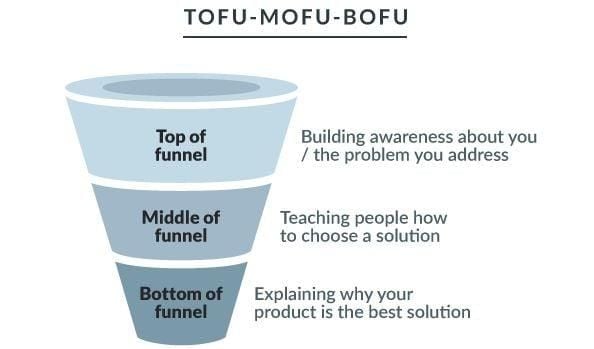
For example:
- You can use content marketing like blogs and social media messages at the top of the funnel to attract customers and raise brand awareness.
- You can use email marketing and webinars in the middle of the funnel to nurture leads and demonstrate how you offer value.
- You can use PPC and retargeted display ads at the bottom of the funnel to engage prospective customers and drive them towards making a purchase.
Understand What You Can (and Can’t Do)
High-ticket affiliate marketing programs often have strict terms and conditions. This makes a lot of sense; when you’re marketing luxury goods, you don’t want to do anything that brings their brand into disrepute.
For example, many high-ticket affiliate marketing programs don’t let affiliates use Google Ads or paid search. This is because paid search done incorrectly can drive poor-quality traffic or push the cost of the affiliate program’s branded keywords up.
It’s always important to understand the terms and conditions and stay compliant—ask questions if you’re unsure. Otherwise, you risk being excluded from the program and losing any pending commission.
FAQs
High-ticket affiliate marketing is when you earn a commission for promoting a product or service on behalf of a client. You can do this in many ways, including through articles, social media, posts, PPC advertising, and videos.
The “high-ticket” aspect of this type of affiliate marketing relates to the products and services you sell. These are higher value than you might see through standard affiliate marketing platforms, meaning you must invest more time building credibility and trust.
Many industries offer high-ticket affiliate marketing opportunities, including:
SaaS products and services
Education solutions and course providers
Finance
Travel and hospitality
Luxury products (for example, jewelry, designer clothing)
Yes! While it can be hard work, high-ticket affiliate marketing is a legitimate way to earn money.
Always do your research before enrolling on a program. Check out reviews from affiliate marketers, read the terms and conditions, and reach out to the affiliate program with any questions. Legitimate affiliate programs will be more than happy to answer any queries you have.
If an affiliate marketing program asks for money upfront or something feels off, it’s okay to walk away.
High-ticket affiliate marketing platforms offer a higher rate of commission than standard affiliate marketing programs. This is to compensate you for the time and effort to persuade a customer to sign up.
High-ticket affiliate programs typically have a commission rate of at least 10 percent, although it can go much higher depending on the product or service.
Here are my top tips for people new to high-ticket affiliate marketing:
Choose a niche that you have experience in or are passionate about.
Start with one affiliate marketing channel at first. Any more can be overwhelming.
Understand your target audience and the marketing channels you will use to attract them.
Read the terms and conditions to understand what you can and can’t do.
Don’t be afraid to ask questions if you’re unsure about anything.
Conclusion
High-ticket affiliate marketing sounds a lot more daunting than it is.
The key is finding a product or service you’re passionate about, identifying the right marketing channels to sell through, and knowing the right target audience to sell to.
Once you’ve got a plan in place, the sky’s the limit. According to ZipRecruiter, the average high-ticket affiliate marketer earns over $46,000 a year, with many making considerably more.
Whether you’re new to affiliate marketing or a seasoned pro, you can use this guide to choose the perfect high-ticket affiliate marketing platform to partner with, and grow your business.
Do you engage in high-ticket affiliate marketing? What’s your experience been like? I’d love to hear your thoughts in the comments.
[ad_2]
Article link
